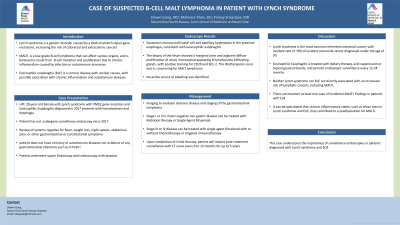Sunday Poster Session
Category: Small Intestine
P1318 - Case of Suspected B-Cell MALT Lymphoma in Patient With Lynch Syndrome
Sunday, October 22, 2023
3:30 PM - 7:00 PM PT
Location: Exhibit Hall

Has Audio
- SL
Shawn Liang, MD
Mount Sinai South Nassau
Bellmore, NY
Presenting Author(s)
Shawn Liang, MD1, Mahnoor Khan, DO2, Pranay Srivastava, MD3
1Mount Sinai South Nassau, Bellmore, NY; 2ISMMS Mt. Sinai South Nassau, Oceanside, NY; 3Mount Sinai South Nassau, Oceanside, NY
Introduction: Lynch syndrome is a genetic disorder caused by DNA mismatch repair gene mutations, increasing the risk of colorectal and extracolonic cancers. Currently, no association between Lynch syndrome and Extranodal marginal zone lymphoma of mucosa-associated lymphoid tissue (MALTL) has been reported. Eosinophilic esophagitis (EoE) is a chronic disease with unclear causes, characterized by symptoms like dysphagia, acid reflux, and abdominal pain. EoE is typically managed symptomatically, and there is no known link between EoE and gastrointestinal malignancies. However, there has been at least one case of incidental MALTL findings in patients with EoE.
This paper describes a case of a patient with a history of Lynch syndrome and Eosinophilic Esophagitis, who presented with hematochezia and was found to have MALT lymphoma.
Case Description/Methods: The patient is a 28-year-old female with Lynch syndrome with PMS2 gene mutation and Eosinophilic Esophagitis in 2017 presents with dysphagia. She has not undergone surveillance endoscopy since then and is on a proton pump inhibitor only. The patient denies other gastrointestinal or B symptoms. She underwent upper endoscopy and colonoscopy with biopsies, revealing squamous mucosa with basal cell and papillary hyperplasia in the proximal esophagus, consistent with eosinophilic esophagitis. The biopsy of the ileum showed a marginal zone and adjacent diffuse proliferation of small, monocytoid appearing B lymphocytes infiltrating glands, with positive staining for CD20 and BCL-2. The Wotherspoon score was 4, concerning for MALT lymphoma.
Discussion: MALTL is a low-grade B-cell lymphoma that can affect various organs, including the gastrointestinal tract, lung, thyroid, skin, and other epithelial tissues. It is believed to result from B-cell mutation and proliferation due to chronic inflammation caused by infection or autoimmune processes. This patient does not have a history of autoimmune diseases nor evidence of any gastrointestinal infections such as H Pylori, and neither Lynch syndrome nor EoE are directly associated with an increased risk of lymphatic cancers. However, it can be speculated that chronic inflammatory states, such as those seen in Lynch syndrome and EoE, may contribute to a predisposition for MALTL. Nevertheless, this case underscores the importance of surveillance endoscopies in patients diagnosed with Lynch syndrome.
Disclosures:
Shawn Liang, MD1, Mahnoor Khan, DO2, Pranay Srivastava, MD3. P1318 - Case of Suspected B-Cell MALT Lymphoma in Patient With Lynch Syndrome, ACG 2023 Annual Scientific Meeting Abstracts. Vancouver, BC, Canada: American College of Gastroenterology.
1Mount Sinai South Nassau, Bellmore, NY; 2ISMMS Mt. Sinai South Nassau, Oceanside, NY; 3Mount Sinai South Nassau, Oceanside, NY
Introduction: Lynch syndrome is a genetic disorder caused by DNA mismatch repair gene mutations, increasing the risk of colorectal and extracolonic cancers. Currently, no association between Lynch syndrome and Extranodal marginal zone lymphoma of mucosa-associated lymphoid tissue (MALTL) has been reported. Eosinophilic esophagitis (EoE) is a chronic disease with unclear causes, characterized by symptoms like dysphagia, acid reflux, and abdominal pain. EoE is typically managed symptomatically, and there is no known link between EoE and gastrointestinal malignancies. However, there has been at least one case of incidental MALTL findings in patients with EoE.
This paper describes a case of a patient with a history of Lynch syndrome and Eosinophilic Esophagitis, who presented with hematochezia and was found to have MALT lymphoma.
Case Description/Methods: The patient is a 28-year-old female with Lynch syndrome with PMS2 gene mutation and Eosinophilic Esophagitis in 2017 presents with dysphagia. She has not undergone surveillance endoscopy since then and is on a proton pump inhibitor only. The patient denies other gastrointestinal or B symptoms. She underwent upper endoscopy and colonoscopy with biopsies, revealing squamous mucosa with basal cell and papillary hyperplasia in the proximal esophagus, consistent with eosinophilic esophagitis. The biopsy of the ileum showed a marginal zone and adjacent diffuse proliferation of small, monocytoid appearing B lymphocytes infiltrating glands, with positive staining for CD20 and BCL-2. The Wotherspoon score was 4, concerning for MALT lymphoma.
Discussion: MALTL is a low-grade B-cell lymphoma that can affect various organs, including the gastrointestinal tract, lung, thyroid, skin, and other epithelial tissues. It is believed to result from B-cell mutation and proliferation due to chronic inflammation caused by infection or autoimmune processes. This patient does not have a history of autoimmune diseases nor evidence of any gastrointestinal infections such as H Pylori, and neither Lynch syndrome nor EoE are directly associated with an increased risk of lymphatic cancers. However, it can be speculated that chronic inflammatory states, such as those seen in Lynch syndrome and EoE, may contribute to a predisposition for MALTL. Nevertheless, this case underscores the importance of surveillance endoscopies in patients diagnosed with Lynch syndrome.
Disclosures:
Shawn Liang indicated no relevant financial relationships.
Mahnoor Khan indicated no relevant financial relationships.
Pranay Srivastava indicated no relevant financial relationships.
Shawn Liang, MD1, Mahnoor Khan, DO2, Pranay Srivastava, MD3. P1318 - Case of Suspected B-Cell MALT Lymphoma in Patient With Lynch Syndrome, ACG 2023 Annual Scientific Meeting Abstracts. Vancouver, BC, Canada: American College of Gastroenterology.
